Advancing your Training
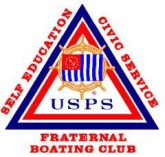 |
One of the three main objectives of the U.S. Power Squadron, is quality education. As a matter of fact, it is probably our most important contribution to boating. The Vero Beach Power Squadron, has a very extensive education program. From training first time boaters to high end skills for serious boaters. All of this is done at our facility in Vero Beach - 301 Acacia Road |
 |
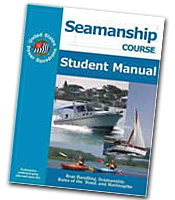 |
Seamanship
Seamanship is a natural
first/next step in building a foundation for confidence and competence
in safe and enjoyable boating on the water. It extends the knowledge
and skills of the boater in handling and maneuvering a vessel, either
sail or power. The course provides a better understanding of how boats
behave under various conditions including close quarters and open water
operations. Knowledge and skills are increased in the areas of
anchoring, emergencies, rules of the road, and marlinespike/basis
knots. Appendices include information to safe operation in waters of
our neighbors to the north and south, Canada and Mexico. The course
content and our coastal navigation courses should help in preparation
for completion of the US Coast Guard licensing examination.
An On-The-Water component enhances the learning experience.
|
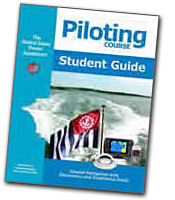 |
Piloting
Piloting is the first of
a two-part navigation series for inland and coastal boaters. Piloting
teaches the essentials of safe navigation using GPS and electronic
tools in conjunction with charts and available marine data (waypoint
navigation). In order to check the GPS, and to navigate in the event of
any uncertainty, traditional navigation skills are taught. You learn
how to use landmarks and navigation aids to check your position and
navigate using dead reckoning.
|
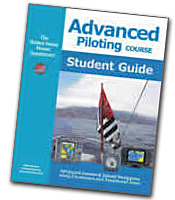 |
Advanced
Piloting
Advanced
Piloting is the final inland and coastal navigation course.
It furthers your understanding of electronic navigation and tools to
include the use of radar, depth sounders, chart plotters and digital
charts. It also expands your understanding of safe navigation by
showing you how to fix your position with precision by traditional
techniques, how to implement avoidance navigation to stay clear of
hazards, and how to navigate in the presence of tides and currents.
|
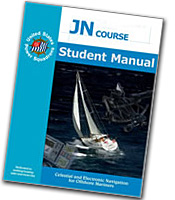 |
Junior
Navigation
Junior Navigation the
title is traditional, the subject matter is quite advanced. This is the
first of a two-part series in offshore navigation. Again, the emphasis
is on safe and effective electronic navigation. However, outside sight
of land and navigation aids, you are taught to use the sun. The basics
of celestial navigation are instructed and you take sights on the sun
to derive fixes of position. You also learn about the unique conditions
and considerations in offshore navigation.
|
 |
Navigation
Navigation; our
senior-most navigation course. This is for the potential blue-water
mariner. It takes your celestial navigation skills to a new level,
showing you how to take sights and fix position using the moon,
planets, and stars. You will take more complex sights and learn
multiple approaches to reducing them. Then, true to our emphasis on
electronic navigation, you will learn how to use electronic tools to
plan and execute your offshore voyage.
|
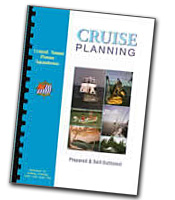 |
Cruise
Planning
There is something very
special about the thrill of cruising in new waters and the sense of
accomplishment upon completing an extended cruise. To go beyond what
most boaters do on a weekend overnight or even a week or so marina
hopping requires boaters to leave their normal cruising areas and
comfort zones. The
Cruise Planning course focuses on the planning and preparation necessary for safe enjoyable extended cruises on both inland and coastal waters. Designed for members who cruise on either a sail or powerboat (owned or chartered) |
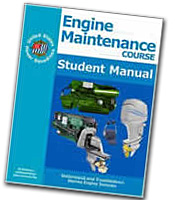 |
Engine
Maintenance
The Engine
Maintenance course has been put into one ten chapter course that
stresses the diagnosis of modern systems, while also teaching the
basics of engine layout and operation.
Gasoline inboards, outboards, and diesel engines are taught in a way that reinforces the common aspects of how engines work. This new course is complete in one book with one exam. Modern engines offer high reliability and good performance through the use of computerized systems for fuel delivery and engine timing. Most of these systems are black boxes that can no longer be serviced by weekend mechanics with ordinary tools. The EM course covers those repairs that do-it-yourselfers can still perform, teaches how to diagnose problems that might be beyond your ability to fix, and how to share information with your mechanic so the right repairs get performed. The new Engine Maintenance course also covers basic mechanical systems such as drive systems (propellers), steering systems, and engine controls. The last chapter discusses solutions you might use to problems that could occur while afloat and away from a repair facility. |
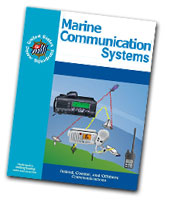 |
Marine
Communications Systems
Marine Communications
Systems explains the various shipboard communications systems
from VHF to Single Sideband and satellite, the services associated with
each. You will learn how to select, install, operate and troubleshoot
your communication gear.
|
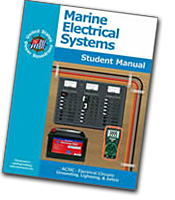 |
Electrical
System Maintenance
Electrical Systems is a
course dedicated to onboard electrical power both AC and DC.
You will learn about electrical circuits, wiring, terminating, and
routing wiring for safety and trouble-free operation. You will learn
how to use multimeter's and tools to check, diagnose and repair
electrical problems. You also will learn about galvanic corrosion,
stray currents, isolation, grounding, and safety of electrical systems.
|
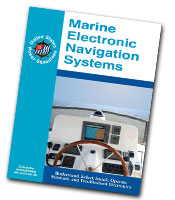 |
Electronic
Navigation Systems
Electronic Navigation
Systems explains the application, uses, installation,
operation, and troubleshooting of a host of electronic systems.
Included are GPS, chart plotters, electronic navigation systems, radar,
automatic identification systems, depth sounders, sonar, autopilots,
electronic compasses, wind and water sensors, and their associated
components.
|
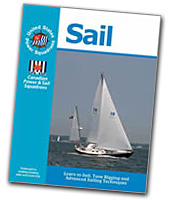 |
Sail
Sail is a complete sail
course created to serve the needs of the novice and experienced sailor,
as well as the non-sailor, for basic skills and knowledge. The course
starts with basic sailboat designs and nomenclature, rigging, safety,
and sail processes and then tackles the physical aspects of sailing
forces and techniques sail applications, marlinespike, helmsmanship and
handling of more difficult sailing conditions, navigation rules, and an
introduction to heavy weather sailing. An On-The-Water component
enhances the learning experience. Appendices provide an introduction to
sailboat racing and sailing in Canadian waters.
|
 |
Weather
The safety and comfort of
those who venture out-on-the water have always been weather dependent.
In this course students will become keener observers of the weather,
but weather observations only have meaning in the context of the basic
principles of meteorology, the science of the atmosphere. The
course focuses on how weather systems form, behave, move, and interact
with one another and reflects the availability of all sorts of weather
reports and forecasts on the Internet. Wx2012 is a general weather
course benefiting those sitting in their living rooms, as much as those
standing behind the helm.
|